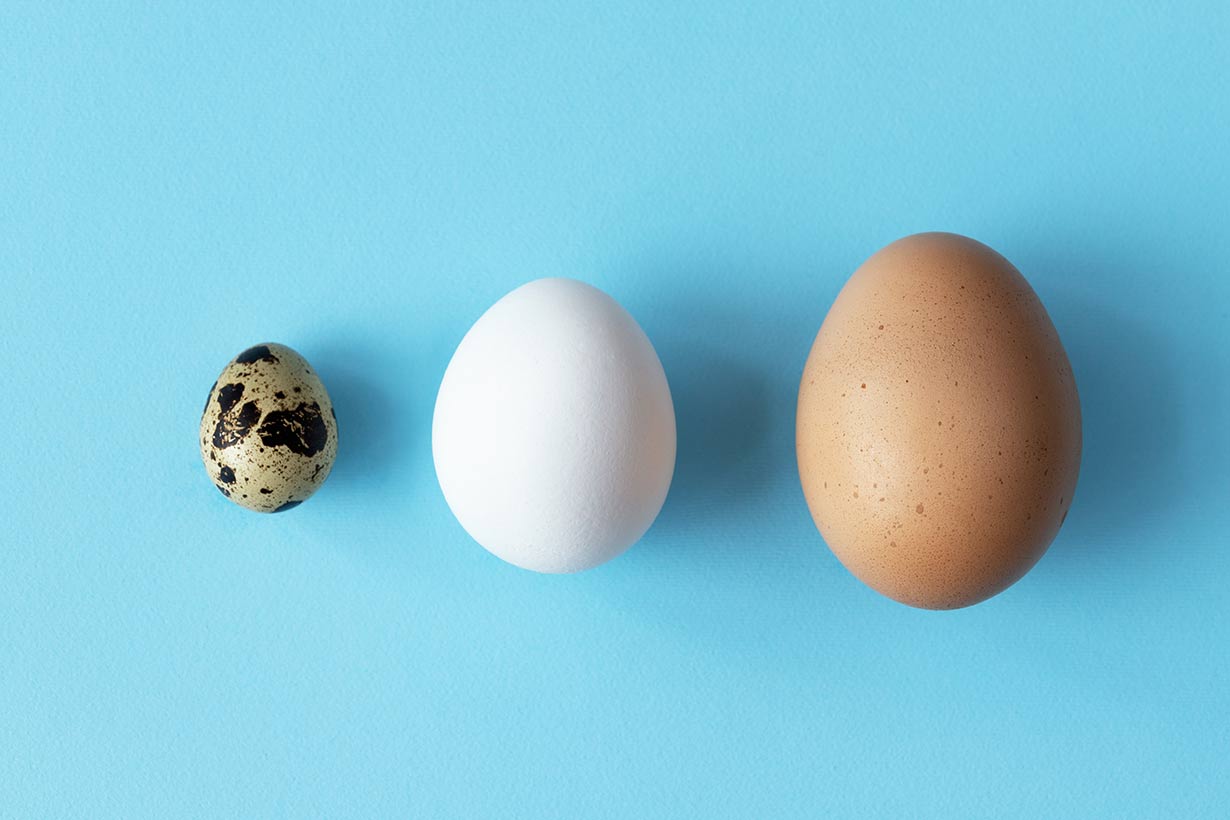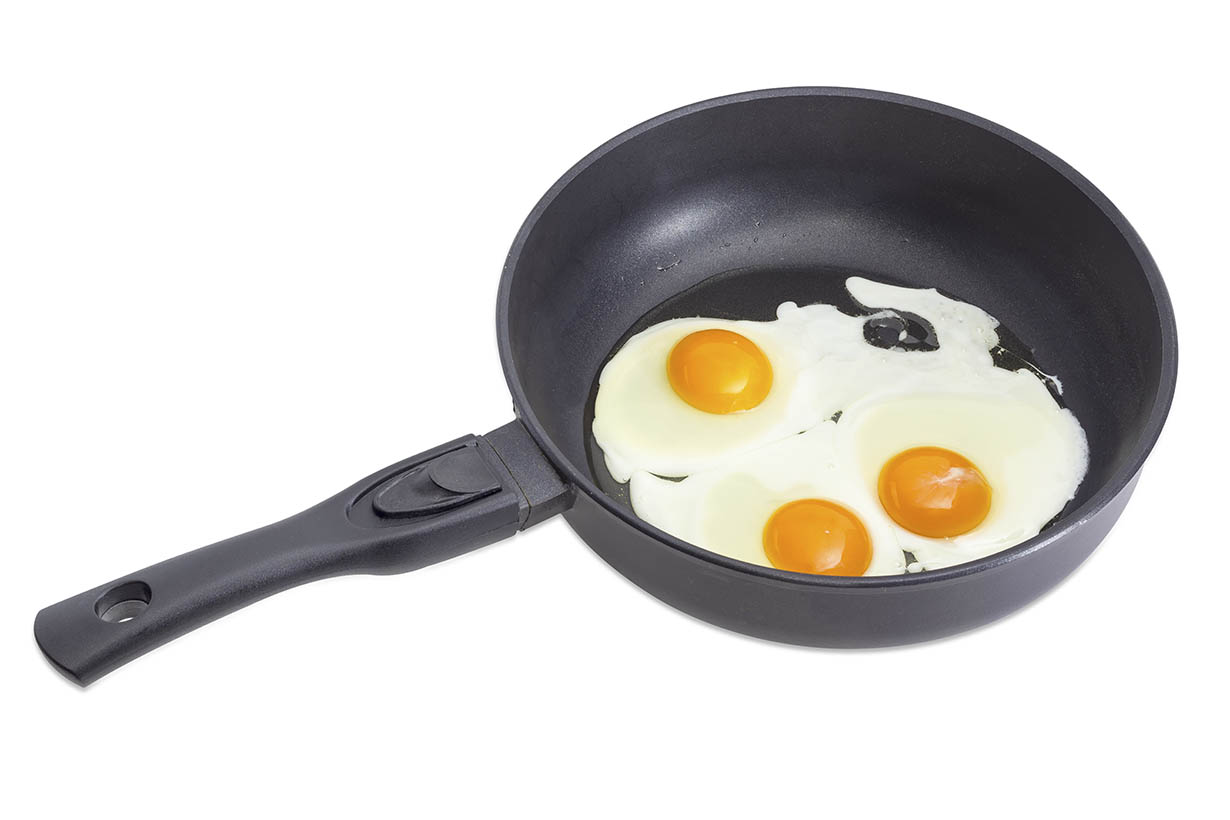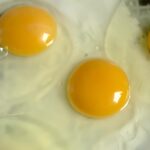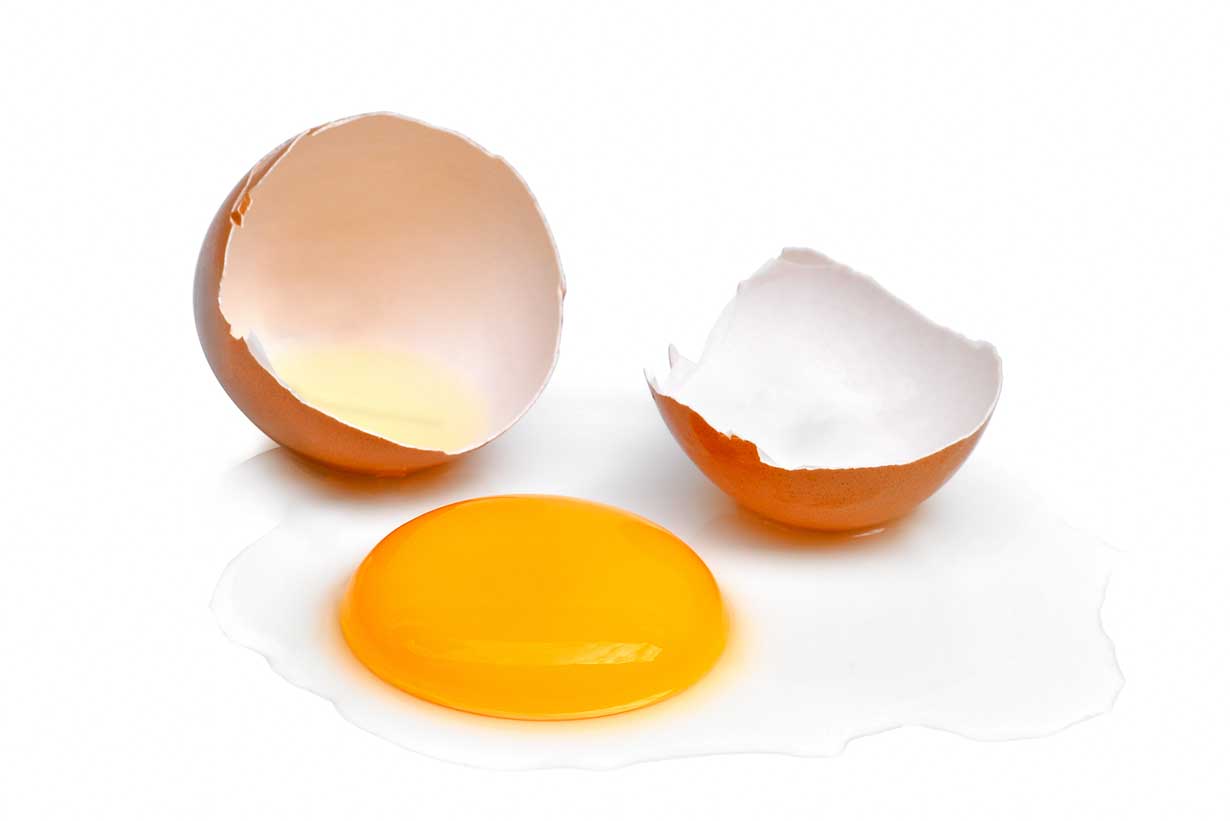Quail eggs look just like regular eggs, but they are much smaller.
What exactly are these small eggs, and what nutritional values do they provide?
Here is a complete guide to quail eggs, their nutritional properties, potential benefits, and downsides.
Table of contents
What Are Quail Eggs?
Quail eggs are just a type of egg, but they come from a quail rather than a chicken.
The quail is a small bird that grows to approximately 140 grams (4.9 oz) in weight and lives worldwide (1).
Like all birds, quail lay eggs.
However, at only 9 grams per egg, quail eggs are roughly only 20% of the size of a typical (50-gram) chicken egg (2, 3).
Quail eggs come in various colors, with pale shades of green, blue, yellow, white, brown, and pink being common.
That said, quail eggs all tend to have a common characteristic: a speckled appearance. For example, in the picture below, we can see the typical appearance of quail eggs:

On the negative side, quail eggs are harder to find than regular eggs, and they tend to be more expensive gram-for-gram.
That said, quail eggs are relatively common in some parts of the world and not so expensive.
Quail eggs are prevalent in South America and parts of Asia, such as Japan, the Philippines, and Thailand.
Nutrition Facts
Using the USDA FoodData Central database as a data source, here are the nutritional values for quail eggs per 100-gram (3.5 oz) serving. Note: 100 grams of quail eggs is equivalent to approximately eleven standard 9-gram quail eggs (2).
Daily values have been calculated from the USDA data and the FDA’s published daily values (2, 4).
| Name | Amount | % Daily Value (%DV) |
|---|---|---|
| Calories | 158 kcal | |
| Carbohydrates | 0.41g | <1% DV |
| Fiber | 0g | 0% DV |
| Sugars | 0.4g | |
| Fat | 11.1g | 14% DV |
| Saturated | 3.56g | 18% DV |
| Monounsaturated | 4.32g | |
| Polyunsaturated | 1.32g | |
| Omega-3 | 0.04g | |
| Omega-6 | 0.94g | |
| Protein | 13.0g | 26% DV |
As shown, quail eggs are high in protein and fat, containing a minimal amount of carbohydrates.
Most of the fat content is saturated and monounsaturated fatty acids.
Although eggs (particularly omega-3-enriched eggs) can sometimes be a good source of omega-3, this largely depends on the diet of the animal,
Vitamins
- Vitamin B12: 66% of the daily value
- Riboflavin (B2): 61% DV
- Choline: 48% DV
- Pantothenic acid (B5): 35% DV
- Folate: 17% DV
- Vitamin A RAE: 17% DV
- Thiamin (B1): 11% DV
- Vitamin B6: 9% DV
- Vitamin D: 7% DV
- Vitamin E: 7% DV
- Vitamin K: <1% DV
RAE = Retinol activity equivalents.
Minerals
- Selenium: 58% DV
- Iron: 20% DV
- Phosphorus: 18% DV
- Zinc: 13% DV
- Copper: 7% DV
- Sodium: 6% DV
- Calcium: 5% DV
- Potassium: 3% DV
- Magnesium: 3% DV
- Manganese: 2% DV
Benefits of Quail Eggs
Here is a summary of the benefits of quail eggs, most of which are from their nutritional values.
Quail Eggs Are Nutrient-Dense
As shown in the nutrition facts section, per 100 grams, quail eggs provide more than 10% of the daily value for eleven different vitamins and minerals (2, 4).
These vitamins and minerals include vitamin B12, riboflavin, selenium, choline, pantothenic acid, iron, phosphorus, folate, vitamin A, zinc, and thiamin.
This nutrient provision is for only 158 calories, making quail eggs a nutrient-rich food.
Good Source of Protein
Quail eggs provide a good amount of dietary protein (2):
- 13.0 grams of protein per 100 grams
- 8.23 grams of protein per 100 calories
As with most animal foods, quail eggs are a complete source of protein. Complete proteins provide a sufficient amount of each essential amino acid.
In the table below, you can see the amino acid profile for 100 grams of quail eggs (2):
| Name | Amount |
|---|---|
| Tryptophan | 0.209g |
| Threonine | 0.641g |
| Isoleucine | 0.816g |
| Leucine | 1.15g |
| Lysine | 0.881g |
| Methionine | 0.421g |
| Cystine | 0.311g |
| Phenylalanine | 0.737g |
| Tyrosine | 0.543g |
| Valine | 0.94g |
| Arginine | 0.835g |
| Histidine | 0.315g |
| Alanine | 0.762g |
| Aspartic acid | 1.29g |
| Glutamic acid | 1.66g |
| Glycine | 0.434g |
| Proline | 0.518g |
| Serine | 9.992g |
The essential amino acids have been highlighted in bold.
One of the Best Sources of Choline
Choline is an essential nutrient, and quail eggs—like all eggs—are an excellent source.
Among choline’s various functions, the nutrient is vital for brain development and liver health. In the latter case, a choline deficiency can increase the risk of non-alcoholic fatty liver disease (NAFLD) (5).
The United States Food and Drug Administration (FDA) has set a daily value for choline of 550 mg per day. However, according to the 2013-2014 National Health and Nutrition Examination Survey (NHANES), the average daily intake of choline is 402 mg for males and 298 mg for females (6).
Just 100 grams (3.5 oz) of quail eggs offers 263 mg of choline, equivalent to 48% of the daily value (2, 4).
A Source of Preformed Vitamin A (Retinol)
Not many foods contain preformed vitamin A, otherwise known as retinol. However, of those that do, some of the best sources include oily fish, liver, and eggs – including quail eggs.
One hundred grams (3.5 oz) of quail eggs provides 156 mcg of vitamin A, representing 17% of the recommended daily value (2, 4).
How Do Quail Eggs Compare To Chicken Eggs?
Now that we have established quail eggs offer a broad range of nutrients, how do they compare to chicken eggs?
First of all, quail eggs have a larger ratio of egg yolk to egg white than chicken eggs, which slightly affects the taste and nutritional profile. However, the two options are very similar, both nutritionally and for taste purposes.
The table below shows the basic nutritional profile of quail and chicken eggs per 100-gram serving for an at-a-glance comparison (2, 7).
For clarity, the higher figure for each nutrient is in bold font.
| Name | Quail Eggs | Chicken Eggs |
|---|---|---|
| Calories | 158 kcal | 143 kcal |
| Carbohydrates | 0.41g | 0.72g |
| Fiber | 0g | 0g |
| Sugars | 0.4g | 0.37g |
| Fat | 11.1g | 9.51g |
| Saturated | 3.56g | 3.13g |
| Monounsaturated | 4.32g | 3.66g |
| Polyunsaturated | 1.32g | 1.91g |
| Omega-3 | 0.04g | 0.10g |
| Omega-6 | 0.94g | 1.58g |
| Protein | 13g | 12.56g |
| Calcium | 64.0 mg | 56.0 mg |
| Iron | 3.65 mg | 1.75 mg |
| Magnesium | 13.0 mg | 12.0 mg |
| Phosphorus | 226.0 mg | 198.0 mg |
| Potassium | 132.0 mg | 138.0 mg |
| Sodium | 141.0 mg | 142.0 mg |
| Zinc | 1.47 mg | 1.29 mg |
| Copper | 0.062 mg | 0.072 mg |
| Manganese | 0.038 mg | 0.03 mg |
| Selenium | 32.0 mcg | 30.7 mcg |
| Vitamin C | 0 mg | 0 mg |
| Thiamin | 0.13 mg | 0.04 mg |
| Riboflavin | 0.79 mg | 0.46 mg |
| Niacin | 0.15 mg | 0.08 mg |
| Pantothenic acid | 1.76 mg | 1.53 mg |
| Vitamin B6 | 0.15 mg | 0.17 mg |
| Folate | 66.0 mcg | 47.0 mcg |
| Choline | 263.0 mg | 294.0 mg |
| Vitamin B12 | 1.58 mcg | 0.89 mcg |
| Vitamin A RAE | 156.0 mcg | 160.0 mcg |
| Vitamin E | 1.08 mg | 1.05 mg |
| Vitamin D | 1.4 mcg | 2.0 mcg |
| Vitamin K | 0.3 mcg | 0.3 mcg |
As we can see from the table, according to USDA data, quail eggs contain slightly higher levels of some nutrients. However, chicken eggs have somewhat higher levels of other nutrients.
Overall, the difference between the two is insignificant, so personal preference/intended usage should dictate the choice.
Downsides
As with most all food, quail eggs have some potential downsides.
They Can Be Expensive
While quail eggs are a common food in some countries, they are not widely used in Europe and North America.
As is usually the case, less common foods tend to have a higher price tag, and quail eggs come at a price premium to regular chicken eggs.
Rare Allergies
All foods can potentially cause allergic reactions.
However, according to Food Allergy and Research Education (FARE), eggs are one of the most common allergens in children (8).
That said, quail eggs may also contain unique allergens that could potentially affect people who have no issue with chicken eggs.
On this note, a case study documented the case of a severe allergic reaction to uncooked quail eggs in a girl aged 10 (9).
In this case, the girl had previously consumed cooked quail eggs and regular chicken eggs without issues. Furthermore, the allergic reaction was caused by a specific protein in quail eggs that don’t cross-react with chicken egg proteins.
Allergic reactions can be severe, so anybody who suspects the possibility of an allergy should speak with their medical team.
Common Questions
While there is often no right amount for each individual, a serving of 100 grams (approx 11 quail eggs) is equivalent to two 50-gram chicken eggs. Therefore, one chicken egg is equal to 5-6 quail eggs.
According to USDA data, quail eggs contain slightly higher levels of several essential nutrients compared to chicken eggs. However, the difference is not substantial, and quail eggs also cost more.
Unfortunately, it will be challenging to find quail eggs for a price comparable with chicken eggs. However, it is possible to find them at reasonable prices. Visiting an Asian grocery store/supermarket will undoubtedly offer better prices than a specialist or premium grocery store.
How To Use Quail Eggs
Firstly, it is possible to prepare quail eggs in all the same ways as regular chicken eggs:
- Boiled
- Fried
- Omelet
- Poached
- Scrambled
However, since quail eggs tend to be more expensive and smaller, it may make more sense to use them in specialist recipes.
They can work well in stir-fries, soups, stews, or simply as a snack.
BBC Good Food has some interesting quail egg recipes here.
For even more ideas from around the world, there are 150+ recipes here.
Final Thoughts
Overall, quail eggs are a protein-rich food that contributes a broad range of essential vitamins and minerals.
However, they are neither superior nor inferior to other egg options.
That said, quail eggs are worth trying, and there are many interesting ways to use them.




